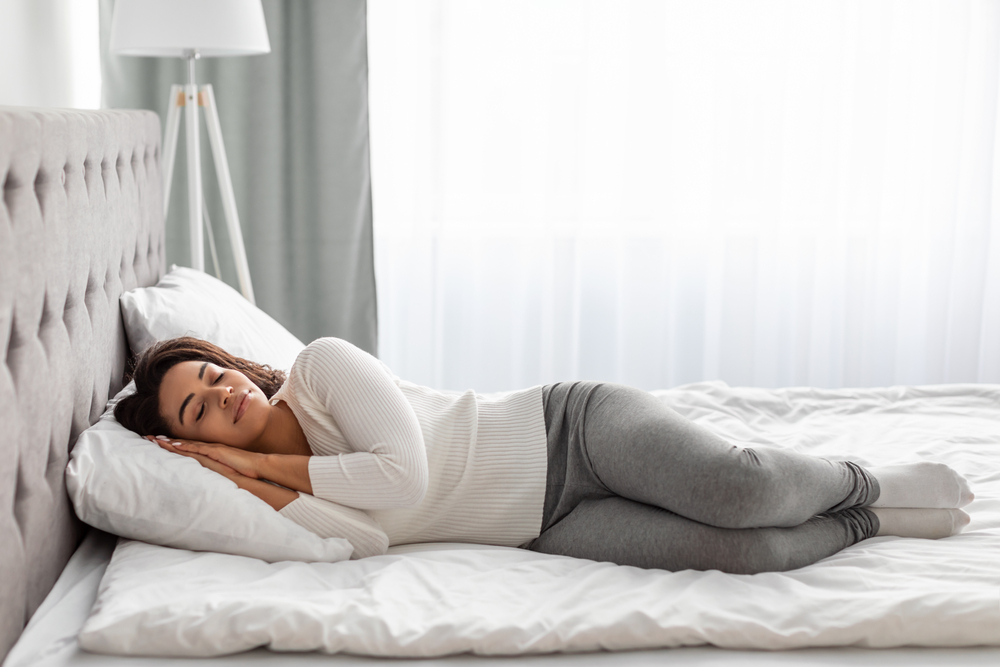You might think your self-image has nothing to do with how well you sleep, but your brain doesn’t see it that way. The relationship between how you perceive yourself and the quality of your rest runs deeper than most people realize, creating a cycle that can either support or sabotage your wellbeing.
When you go to bed feeling good about yourself, your mind settles more easily into restorative sleep. When self-doubt and negative thoughts dominate your inner dialogue, they follow you under the covers, turning bedtime into an anxious replay of every perceived failure from the day.
Negative self-talk becomes bedtime background noise
That critical voice in your head doesn’t clock out when you lie down. If you’ve spent the day beating yourself up about mistakes, appearance, or perceived shortcomings, those thoughts tend to amplify in the quiet darkness of your bedroom. Your mind uses the transition to sleep as an opportunity to process the day’s events, and negative self-perception colors that entire review.
People with poor self-image often experience what sleep specialists call “cognitive arousal” – their minds become hyperactive just when they need to wind down. Instead of drifting peacefully toward sleep, they replay conversations, worry about tomorrow’s challenges, or critique their performance in today’s interactions. This mental chatter keeps the nervous system in an alert state that’s incompatible with quality rest.
The physical symptoms of poor self-image can also interfere with sleep. Stress hormones like cortisol remain elevated when you’re constantly self-critical, making it harder for your body to transition into the relaxed state necessary for deep sleep.
Sleep deprivation worsens self-perception
Poor sleep creates a vicious cycle by making you more vulnerable to negative thinking patterns. When you’re tired, your brain’s prefrontal cortex – the area responsible for rational thinking and emotional regulation – doesn’t function optimally. This makes you more likely to interpret neutral situations negatively and harder on yourself than you would be when well-rested.
Sleep-deprived people tend to focus more on their mistakes and less on their successes. They’re more sensitive to criticism and more likely to engage in social comparison that leaves them feeling inadequate. The exhaustion also affects your ability to cope with daily stressors, making everything feel more overwhelming and reinforcing negative self-beliefs.
Physical appearance concerns often worsen with poor sleep too. Lack of rest affects your skin, posture, and energy levels, which can trigger more self-criticism and body image issues. This creates another layer of negative self-talk that interferes with future sleep quality.
Body image directly impacts sleep positions and comfort
How you feel about your body influences how you position yourself in bed and whether you can relax fully. People who are self-conscious about their appearance might sleep in uncomfortable positions to hide perceived flaws, even from themselves or their partner. This physical tension prevents the deep muscle relaxation necessary for restorative sleep.
Body image concerns can also affect intimacy and relationship dynamics in the bedroom, creating additional stress and anxiety around bedtime. When you’re uncomfortable with your body, the bedroom can become a source of stress rather than a peaceful retreat.
Some people avoid comfortable sleepwear or appropriate room temperatures because of body image issues, prioritizing coverage over comfort in ways that interfere with sleep quality. Your physical comfort during sleep directly affects how well you rest, so these self-image driven choices have real consequences for your health.
Building better sleep through self-compassion
Improving your self-image can dramatically improve your sleep quality, and better sleep makes it easier to maintain a positive self-image. Start by practicing self-compassion during your bedtime routine. Instead of reviewing the day’s failures, acknowledge what went well and treat yourself with the same kindness you’d show a good friend.
Create a bedtime ritual that reinforces positive self-regard. This might include gratitude journaling, gentle stretching, or simply telling yourself one thing you appreciate about how you handled the day. These practices help shift your mental state from self-criticism to self-acceptance before sleep.
Practical strategies for breaking the cycle
If negative thoughts tend to surface at bedtime, have a plan for redirecting them. Keep a journal by your bed to write down worries so they don’t cycle in your mind. Practice progressive muscle relaxation to release physical tension that mirrors emotional stress.
Consider your sleep environment as an extension of self-care rather than self-judgment. Invest in comfortable bedding, create a space that feels nurturing, and prioritize your physical comfort without shame or self-consciousness.
The connection between self-image and sleep quality means that working on either one can improve both. Better sleep gives you the emotional resilience to maintain a healthier self-image, while self-compassion creates the mental calm necessary for restorative rest.












